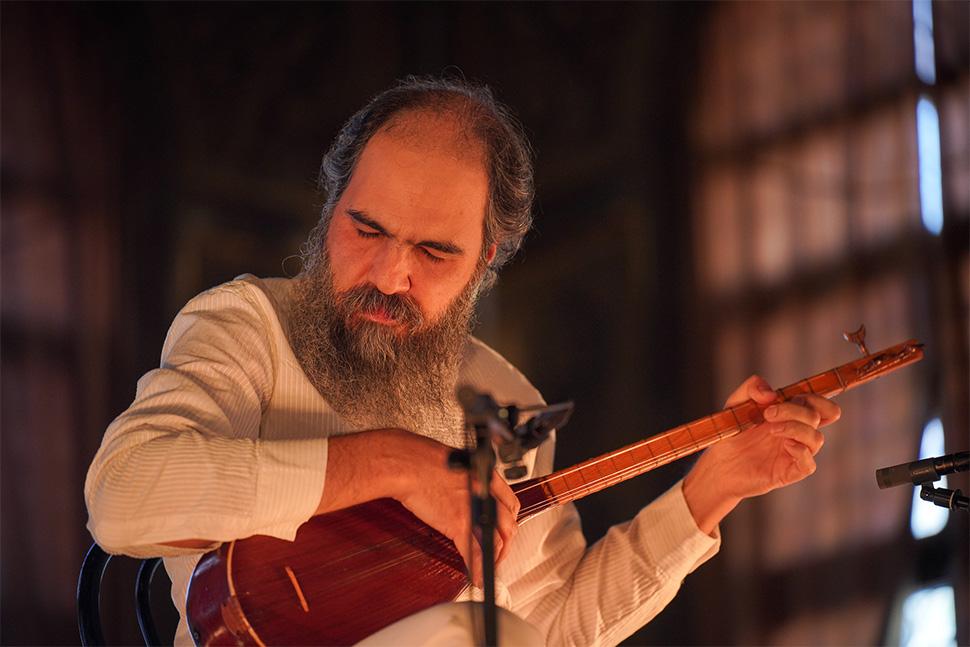| AD IMMITATIONE DELLE PASSIONI (30’): | Texts by Claudio Monteverdi, Giulio Caccini |
|---|---|
| Performative lecture: | Paolo Da Col |
| UNFOLDING, 2022 (30’): | Mehdi Jalali |
| Improvisation on maqâm: | Khan-Amiri, Sahari, Chupi-Razbaari, Savar-Savar e Jelo-Shahi |
| Tanbur: | Mehdi Jalali |
| RAGHS-E-SAMA DA KHAT-E-SEVOM: | 2016, World premiere |
| Tanbur: | Mehdi Jalali |
Paolo Da Col / Mehdi Jalali

PAOLO DA COL -
AD IMMITATIONE DELLE PASSIONI -
“CANTO” AND “DECLAMATO” BETWEEN FLORENCE AND VENICE IN EARLY SEVENTEENTH CENTURY
There is no clear line of demarcation between the polyphony of the sixteenth century and the supposed “invention” of a new form of accompanied song for solo voice in the seventeenth century. Nevertheless, the turn of the century saw the publication in Flor- ence of Giulio Caccini’s Le nuove musiche (1601), his first collection of “songs for solo voice”, in which he boasts the invention of a new style and “noble mode of singing”. The preface to the collection amounts to a virtual codification of the stylistic elements of the new method of singing, which he claims to be close to “natural speech”. Some years later Monteverdi also made use of the expressive recitative style of the madrigal for solo voice. In the preface to his Libro Ottavo di Madrigali guerrieri et amorosi (Venezia 1638), the most lengthy and detailed theoretical treatise that the composer left us, he claims another innovation: the introduction of the genere concitato, derived from the categories of the ancient art of oratory and applied to the composition of Il Combattimento di Tancredi e Clorinda to a text by Torquato Tasso. This work in genere rappresentativo, which had already been performed in Venice at the Palazzo Mocenigo in 1626 “in Carnival time as an entertainment”1, highlights the declamatory potential of the poetic text according to aesthetic principles which – in the composer’s own words – oscillate between parlar cantando and cantar parlando.
MEHDI JALALI - UNFOLDING -
PRAYING RITUAL PER SOLO TANBUR
Tanbur (Kurdish: tembur) is one of the ancient instruments in Iran which has always been associated with spirituality and Sufism. It is an object of veneration in praying ceremonies and rituals. The music of tanbur is based on and comprises maqams. tanbur is perceived as a significantly sacred instrument by adherents of the Yarsan faith and Ahl-e-Haqq; so that practitioners tend to perform their ablution before they start playing and kiss the headstock after.
This holy instrument is the earliest recorded stringed instrument, which is traced back to six thousand years ago. There are seventy-two maqams in its repertoire, classified into three groups of Haqqani maqams (Kalaam), Ceremonial maqams and Virtual maqams.
Haqqani or Kalaam maqams are considered as the major and most important maqams of tanbur, having stronger spiritual state and holiness than others and from the historical point of view, dating back to tenth to fourteenth centuries AD. Kalaam maqams are accompanied by verses or airs, the lyrics of which belong to sacred texts and relics of Yarsanism. Some of the Kalaam maqams are non-metrical, representing prayers, orisons and worships. Some other groups have heavy rhythms with an invariant and specified component which is repeated by participants along with clapping. In addition, several maqams include faster rhythms with recurring verses which lead participants into a state of intoxication and spiritual meditation so that they start to Sama.
According to Master Tahir Yar Veisi, until the fourteenth century AD, Kalaam maqams were kept guarded and utilized only by devotees. In that day and age, Sultan Sahak called for his companions to teach what they had memorized and internalized to others. From that time onward, Haqqani maqams have been passed from masters to apprentices and from preceptors to disciples as written knowledge or through the word of mouth.